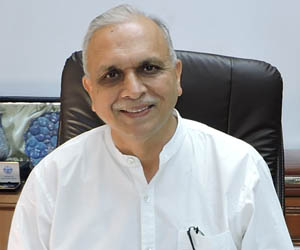- Mr Vladimir Vasilev, Executive Director, The Northern Forum,
- Ambassador Pavan Kapoor, Deputy National Security Advisor, GOI,
- Ambassador Vladislav Maslennikov, Director, Department of European Problems, Russian Foreign Affairs Ministry,
- Ambassador Kanwal Sibal, the Chancellor of Jawaharlal Nehru University,
- Mr Kim Borisov, Deputy Chair, the Government of the Sakha Republic (Yakutia), Permanent Representative of the Sakha Republic (Yakutia) in the Far East Federal District, Russia,
- Members of strategic community,
- Distinguished Guests,
- Ladies and gentlemen,
Welcome to the International Conference "Uniting North and South for Sustainable Development in the Arctic," co-hosted by the VIF and The Northern Forum.
May like to speak a few lines about the VIF.
I would also take this opportunity to welcome the substantial Northern Forum delegation and our co-hosts, who have made the trip from the northern regions of Russia, coming from sub-zero temperatures to experience the warmth of Indian spring.
The conference couldn’t be timelier. As global dynamics shift profoundly in the Trumpian world-order, the Arctic region, which has been lately emerging as an arena of significant geopolitical tension and environmental concern, holds out hope as a frontier of immense opportunity. Recognising these challenges and opportunities, our conference is committed to bridging regional divides and enhancing cooperation among nations.
I am also happy to note that this conference is perhaps the largest gathering of overseas stakeholders of the Arctic, in India, after the launch of India’s Arctic Policy in 2022. Since capacity Building is one of the pillars of India’s Arctic Policy, I am sure that this Conference will be instrumental in raising awareness about the Arctic in India, and providing actionable inputs to the policy makers. Towards that we intend to release an Outcome Document collating all the recommendations made by the various delegates and the speakers.
I am grateful that policymakers at the apex level in India, dealing with Arctic affairs, are participating in this conference.
The Arctic's accelerated warming underscores the urgent need for collaborative efforts across continents. This forum seeks to address how cooperation between diverse regions, particularly between the northern regions and the Global South, can contribute positively to sustainable development and environmental stewardship in the Arctic. Our shared goal is to identify innovative scientific and technological solutions that can navigate the complexities posed by the Arctic's changing landscape. Since the climate change in the Arctic also impacts the entire planet, we must also explore options to make research in the Arctic region, particularly Svalbard, more participative and inclusive.
Since March 2022, the Arctic Council has remained largely inactive in response to Russia’s special military operations in Ukraine. Norway, as chair
Amidst this diplomatic standstill, military activities in the Arctic have surged. NATO countries have ramped up their presence through large-scale exercises, while Russia has expanded its military infrastructure, constructing airbases and radar systems.
Moscow is working to establish an alternative governance framework. This includes plans for an international scientific and educational hub in Svalbard for BRICS and SCO nations, signalling an effort to build new Arctic alliances outside Western-led institutions.
I do hope that the Conference will focus on these relevant issues. Recognising the primacy of India’s scientific oriented Arctic Policy, the per-lunch session will be devoted to scientific co-operation in the Arctic while the post lunch discussions will focus on the geo-politics and governance issues.
Some of the recommendations for Indian policy makers are for consideration:
- Deepening India-Russia Arctic Cooperation: Bolster bilateral collaboration with Russia to address energy security needs and access rare earth and strategic minerals, providing Moscow alternatives to China.
- Enhance Arctic Engagement: Increase Arctic involvement to safeguard national interests and strengthen ties with Western Arctic nations like the US, Norway, and Canada.
- Expanding Influence in the Arctic Council: Actively participate in Arctic Council Working Groups and advocate for the resumption of the Council's activities while pushing for an enhanced role for Observer States.
- Reforming the Arctic Council: Work towards broader reform of the Arctic Council, including seeking full membership to solidify India's position as a significant stakeholder in Arctic governance.
Today's agenda brings together distinguished experts, policymakers, and researchers from India, Russia, and beyond. Through this initiative, we aim to foster dialogue, share critical insights from ongoing Arctic research, and propose inclusive governance strategies. Our discussions will not only consider the geopolitical impacts of current tensions but also explore practical cooperation frameworks involving international entities such as BRICS and the Northern Forum.
It is imperative that we move forward together, overcoming political differences to ensure sustainable development, scientific innovation, and peace in the Arctic region. We at VIF firmly believe that the insights generated here will make meaningful contributions toward an inclusive, cooperative, and sustainable future for the Arctic.
Thank you all for your valuable participation and commitment to this essential dialogue.
Now I invite Mr Vladimir Vasiliev, Director, Northern Forum to speak.











Post new comment